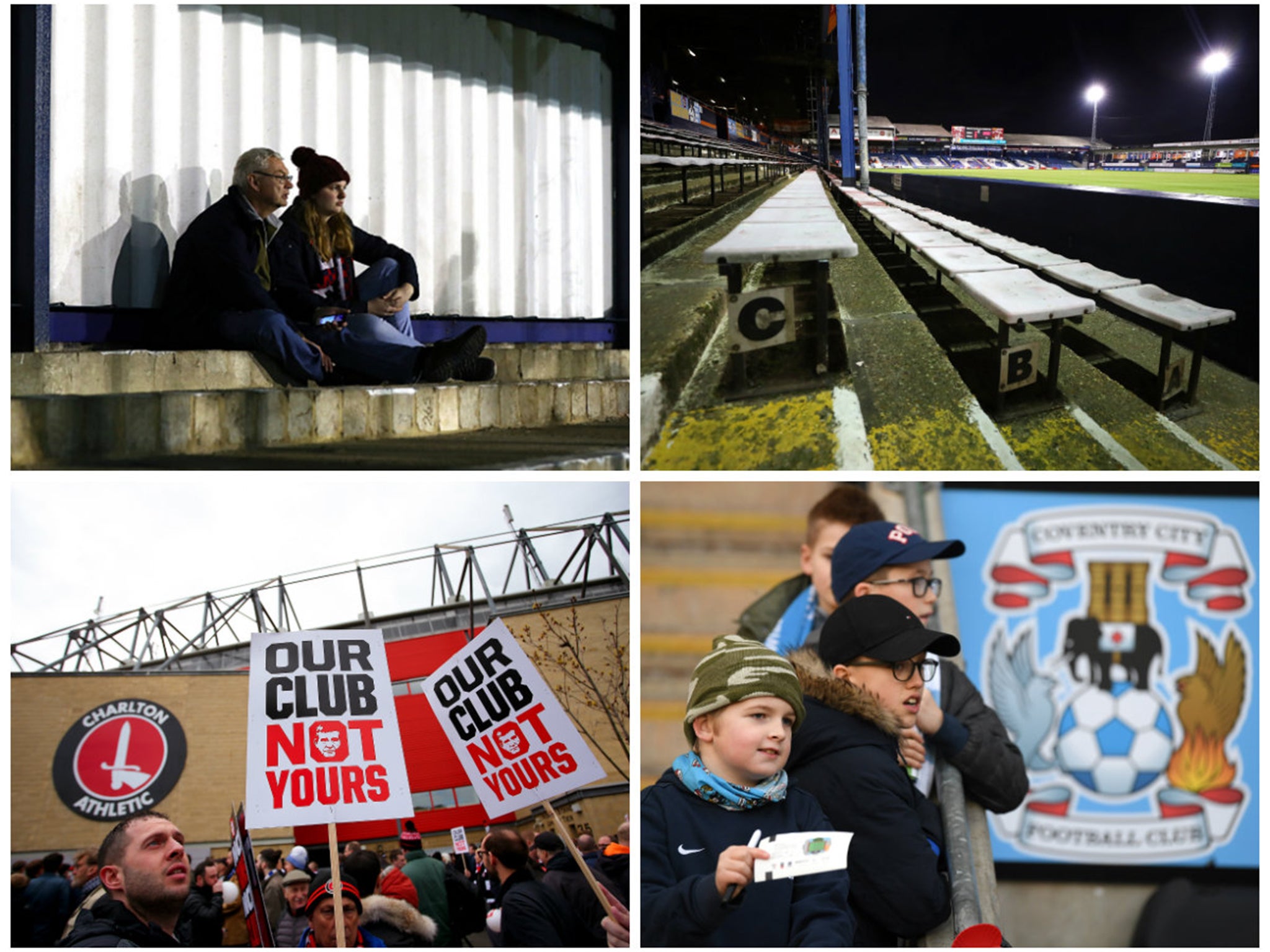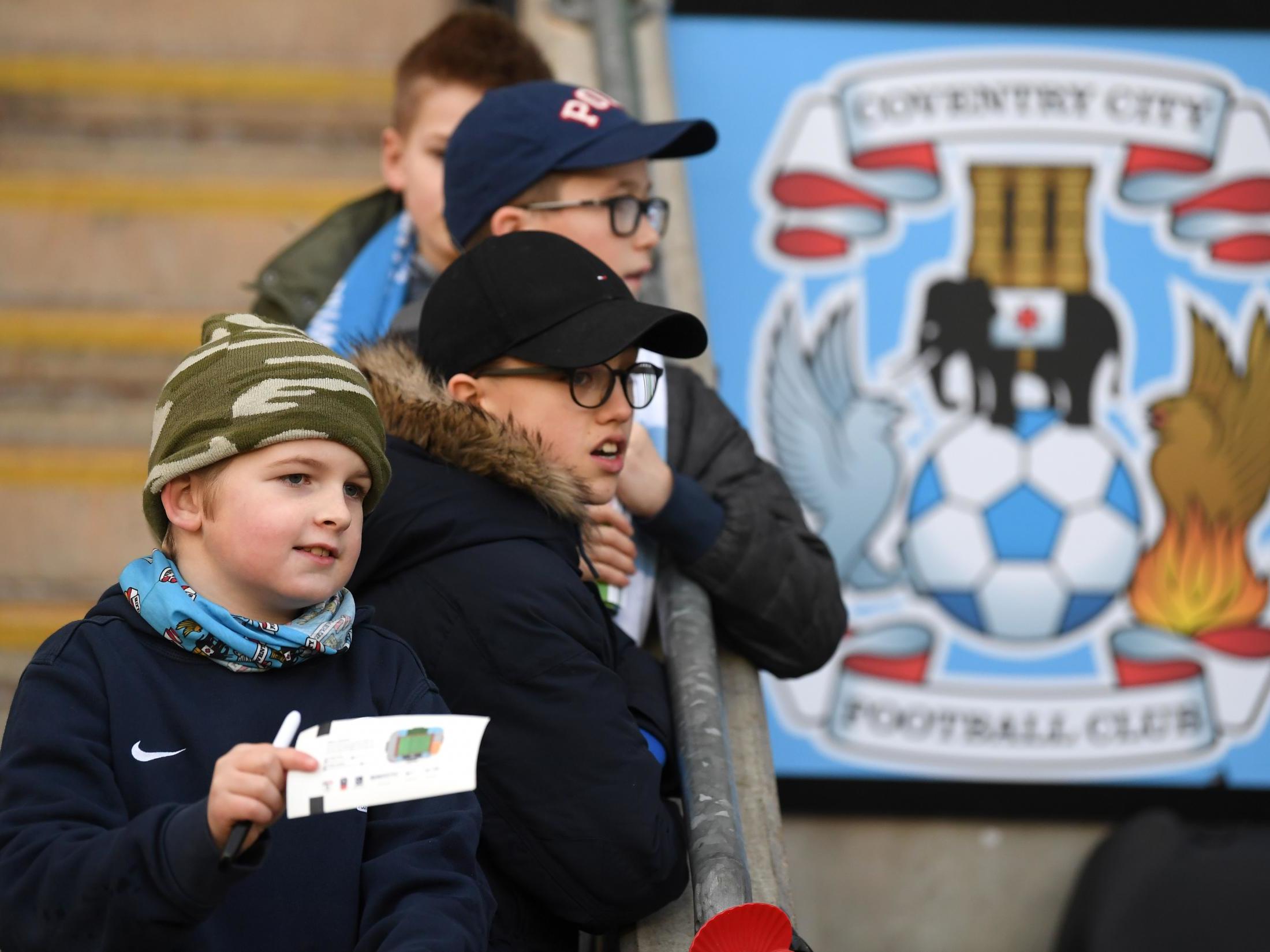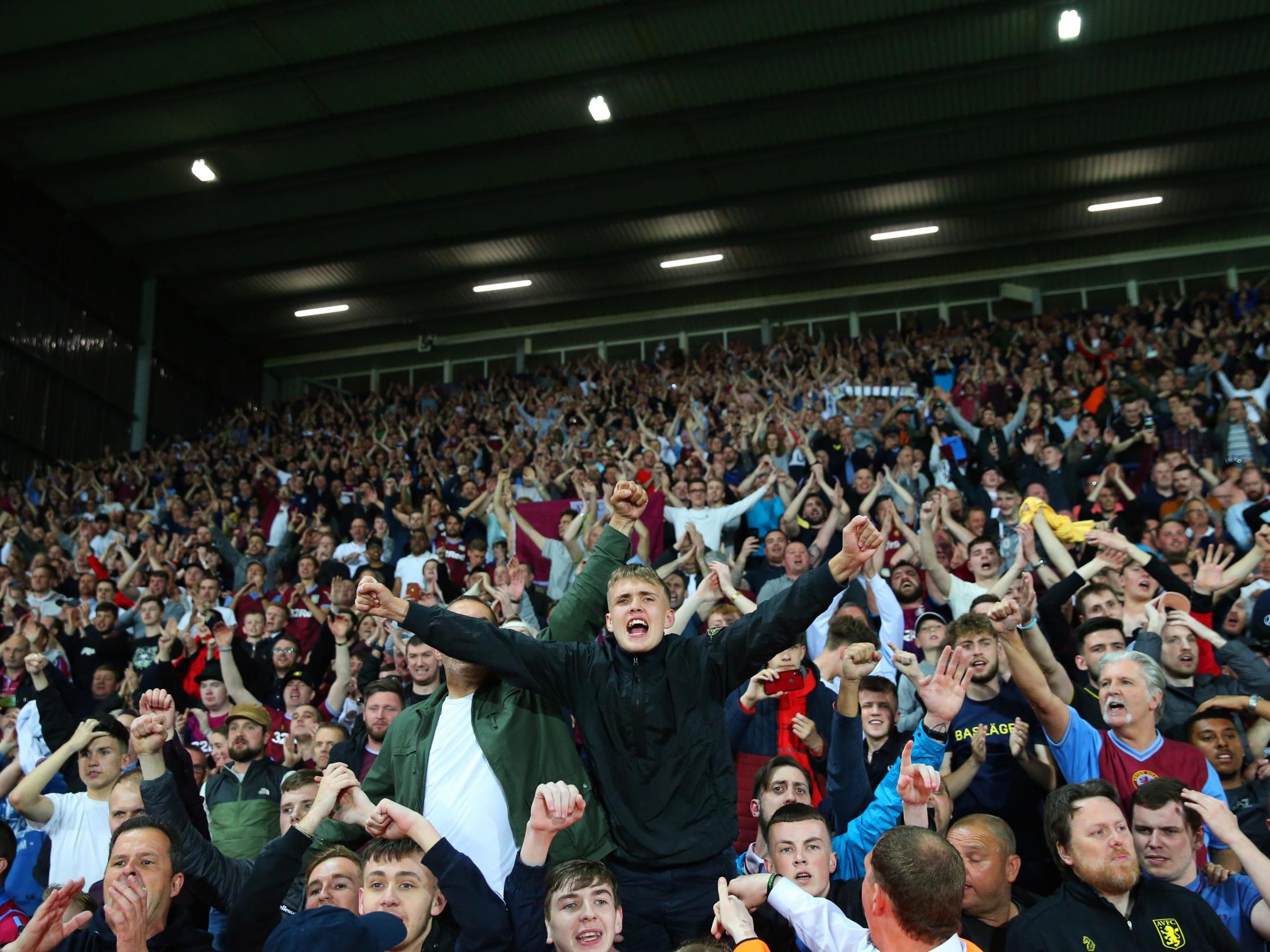The death of the 72? Why football outside the Premier League is on its knees
The gulf between England's top flight and the lower leagues is increasing year by year. What's driving this phenomenon, what does it mean for the future of the game and how can we arrest such concerning developments? Here, Miguel Delaney investigates


Last week, amid the usual cycle of big football stories that consume us all, employees of Bolton Wanderers were using social media for something much more pressing and serious. They contacted Fans Supporting Foodbanks because, after going weeks without pay, they had “no food and were going hungry”. A relief effort was set up to help out, on the same weekend Manchester City were bringing the most lavishly funded project in football history to a peak with the completion of a domestic treble.
The two situations are extremes, with separate factors specific to their circumstances, but still represent a wider contrast that is changing the face of football as we know it.
Bolton are far from the only club in the lower leagues – or the northwest – in serious financial trouble or who have just struggled to pay wages. Similar applies to Morecambe FC, Oldham Athletic, Bury, as well as Coventry City and Southend United, while Blackburn Rovers have posted record losses.
Against that, City are far from the only super-wealthy super-club, but there is now a distinctive group of around 13 across Europe who are doing much more than attracting so much of the wealth of the game. They are also attracting so much of the interest.
The chasm between the two, which almost represent “separate games” and thereby bring up all manner of other tensions, also brings the pertinent question of whether the game can survive in its current form.
The extreme focus on the top end of football – and, in England, the top six – is just one factor threatening to erode so much underneath. The media of course plays a highly significant part, in a cycle rolling over the rest of football. You only have to look at what leads news sites, and look at the scores of Manchester United, Liverpool or Arsenal shirts on those kids that do go to lower-league grounds.
But then there’s also the issue of how most of the next generation of supporters look at the game themselves. It is more digitised, less dependent on the physical act of going to a local club. Key figures in supporter organisations and political bodies that have worked with League One and League Two clubs are now seriously worried.
“Nothing in the demographics of match-going fans, the changes in technology, the changes in the way young people ‘support’ suggests to me this is sustainable,” one source says. “It is not outlandish to worry that 75 per cent of clubs in the bottom two divisions have zero long-term future in their current form.”
This is a prospect that shouldn’t be possible when there is so much wealth in football. But it is about much more than this. It is about the deeply distorting effects of wealth and how it has altered the very fabric of the game.

It is certainly being stretched, almost to tearing point. Mark Palios, the former Football Association chief executive who now owns Tranmere Rovers, fundamentally puts it down to a wider structural issue that ties so many of the problems together at the top of the game.
“The prime determinant in all of this is that there’s a global element at the top of the game that is pulling everybody up,” Palios tells The Independent. “That takes in this fixation on the top six you’re talking about. You’re actually killing off competition. Leicester City was an aberration, as the reality is you’ve got your top six, your mid-table teams like Everton, so then a financial drag. In a sporting structure, where gaps develop, you have a problem. You don’t then have a bridle on aspects like player wages. People will take a gamble to get across that gap – and you’re starting to see that right across the pyramid.
“If I take this club into the Championship, say, we’re competing with clubs who have come bottom of the Premier League and get about £175m. The reality is even the gaps in League One and League Two have started to cause people to overstretch themselves. I have never ever known so many clubs not paying wages on time. So you can see the symptoms coming straight down.

“It’s the upward drag that causes the gaps in the pyramid, and those gaps are tank traps.
“That has to be stopped in some way.”
Therein lies the difficulty.
Because that gap doesn’t just extend to wealth. It extends to the primary source of that wealth: interest. The top end is not just dragging up the football pyramid, it is dragging away so many fans.
“The gap is only going one way in the future, as far as I can see,” football finance expert Kieran Maguire argues, “given that sponsors and TV viewers only want to see a few clubs.”
This isn’t to absolve lower-league clubs, or the system, of responsibility.
“A separate point is that the business model of lower league clubs has to change,” Palios adds. “If gates are your sole limit in terms of the potential of a club then you will struggle.”
That is what is happening.
The English Football League recently released figures showing how 2018/19 attendances were the best in over half a century, but these are greatly boosted by crowds at big clubs like Aston Villa at the top end. The picture underneath is a lot less positive.
As many as 31 of the 48 clubs in the bottom two leagues had average attendances for the last season that were less than half of their stadium capacities. One theory some within the Football Supporters Federation take seriously is that clubs need regular gates of above 5,000 to be sustainable in League Two, and above 10,000 in League One. If that is the case, 36 clubs – 18 in both divisions – fell short.

The frequent debate at almost every lower league club is how to get “bums on seats” but many are at a loss as how to do this. This is because they essentially have to figure out a complex, multi-faceted problem.
Some of this is admittedly down to far greater societal dynamics than football – the sort of which cannot be controlled by the relevant sporting authorities.
Research by figures who have worked with the lower leagues suggest that most 18- to 24-year-olds now consume sport in a totally different way.
Priced out of many stadiums, they have alternative interests and prefer to watch games digitally because it allows more intense conversation on social media and WhatsApp. There, they can immediately access replays of goals and discuss them. This is where the huge focus of the top clubs has an even greater effect, especially in terms of digital interaction. That’s before you even get to the bigger debate over how e-sports, and playing football on consoles, are more popular than playing it on grass.
“If you’re a teenager and you have access to Fifa, social media, live Premier League and Champions League games, and you can play yourself, where does going to Wigan Athletic games for £20 a pop fit into that?” one government source said.
Even the language lower league clubs use to sell tickets is now completely different.
“The old-school dad-and-lad approach regarding your induction into football doesn’t exist to the same extent it used to,” Maguire argues. “And also going along with your schoolmates, because people can stream, and have access to so many matches.

“So, for League One and League Two clubs, they’re now competing on a Tuesday and Wednesday night with Champions League football. And, with the best will in the world, if it is Doncaster Rovers against Colchester United, it has limited appeal when you’ve got the glamour and the glitz of the Champions League matches – which cost relatively less to consume. You don’t have to get out of the house, where you can be online.”
This ‘digitisation’ of football may have a more ruinous societal effect too, one that is worthy of deeper consideration. Football clubs are not just, well, football clubs. They are local social institutions. In many lower league towns, in fact, football is now the sole true community hub. Even local authorities and police forces lean on these clubs, as they are an increasingly rare place where people gather. It is one of the few community bonds remaining.
“The local football club is actually a part of the fabric of this country,” Palios agrees.
Bolton may have had entirely individualised problems due to the fiasco of Ken Anderson’s ownership, but even the events that led to that reflect how they have become a bell-weather for this bigger problem, the drag that has now hurt one of England’s historic clubs.
“This is the thing that’s been thrashed over,” Ian Bridge, founder-member of the Bolton Wanderers Supporters Trust, laments. “It’s the community side of football. I’ve been watching Bolton for over 55 years, and when I started your weekend revolved around going to the football. But society’s changed. It is just another part of living these days, but the community aspect of it is what is in danger of being eroded, and needs protecting.”
This is where a fundamental structural issue comes with the game, and reveals one of two major tensions within English football.
The first is between a club’s sense of responsibility as a social institution and its need to make money.

“One of the consistent conflicts in football is between its need to be run as a business – with all the avarice and accumulation that can encompass – and its social responsibility,” one lower league source says.
“You can’t blame club owners for acting in their interests. If they operate like companies, they are subject to company law and have responsibilities as directors, so it’s down to regulation and the FA to be more specific in what’s required. That becomes very difficult because you’re trying to squeeze a corporate model into an area where there are social responsibilities.”
Bridge argues this tension has been revealed with Bolton. “It needs somebody with an interminable amount of money and patience. The smart business people are looking at it and thinking it’s not worth bothering with.”
The second tension is within the structure of the game itself, as seen with the numerous different bodies, each of which hold their own unique priorities.
“There isn’t one body strong enough to be able to pull it all together at this time,” Palios argues. “There’s no holistic approach. That’s the concern.
“There is an inherent conservatism and traditionalism in the game. You see that in how a lot of the decisions are based on emotions, not facts. Like the debate about Wembley, and happy phrases like ‘selling the birthright’. The reality is I’d sell it in a heartbeat.
“The culture is exacerbated by a not-fit-for-purpose structure. That is, the fragmentation of the game where there are so many different bodies – the FA, the PFA, the EFL – each with a competing interest. That means you come up with sub-optimal solutions.
“That’s creating the gaps you’re getting, the rattle-down effect. There needs to be a root-and-branch review of it all, a concerted holistic approach. But it’s difficult, because it’s like herding cats. Even within one tribe, like the Championship, you’ve got two or three different caucuses you’ve got to bring on board.
“So it’s a difficult thing, and I don’t think it’s necessarily going to happen in the next few years.”
The great concern, then, is what will happen in that time.
Closer to the bottom end of the pyramid, could we have more clubs following Bolton into administration? We might well see more AFC Wimbledon situations. We will certainly have more clubs looking at how they exist.
Closer to the top end, there is the manner the major clubs are so explicitly aiming to be more global. They are targeting other markets. You can see it in pre-season tours. You can see it in almost every aspect. Chelsea got rid of their TV channel and produced a tailored phone app instead, in part because of their growth in North America. There, stats suggest they are the second best supported club, in contrast to the 10th or 15th in Europe.
Looming over all of this are the obvious plans for a Super League, as revealed in Football Leaks, and as for so long suggested by so many senior sources.
Even if it takes a while to get that far, the future may be more akin to the NFL – which is seen to pose the most direct competition to the big clubs – with a huge glossy global product at the top of the game, and then a much more localised structure underneath.
One possibility might be that clubs become super-local, especially given the current strength of non-league and clubs like Dulwich Hamlet.
Both Maguire and Palios – as well as key members of the FSF – have more faith in the pyramid system.

“I think clubs are ultimately quite resilient,” Maguire argues. “Football is a unique industry, and there’s always somebody willing to take the place of those clubs that do go to the wall. That in itself is very rare. Aldershot were the last club to effectively cease to exist, and prior to that it was Maidstone in about 1992. That’s because a football club is the heartbeat of the community. We’ve seen with Portsmouth and Wycombe that even when traditional ownership methods have failed, there is some form of community project that comes in and fills the void.”
“I think there is life in the pyramid and there are ways the pyramid can survive this,” Palios agrees. “There’s still a massive way to go. I just look at the passion of our fans.
“I can’t see that dissipating in my lifetime, because it’s so strong… but you’ve got to be innovative, to make it real.”
One way, in a more global game, might be for such clubs to indeed increase the local aspect. That is one thing Tranmere have done while also developing a symbiosis with their neighbours, Liverpool.
“It’s about building businesses that exploit the club’s potential based on its position in the local community but which are agnostic as regards performance on the pitch. We compete with Liverpool and Everton in two ways. One is affordable live football. Two is making the match experience great, creating the environment, that’s what we’re trying to do with the supporters groups. We’ve done simple things, we’ve brought a drum in! The atmosphere is fantastic. This has been generated. We’ve got an SWA2 campaign, we’ve got pictures of kids on the billboard outside the ground. It’s really taken off.
“The other way we compete, against the big clubs, is access. We, as a local club, have opened up the boardroom, we use it as a network hub. We give them access to the manager and players. You can’t get access to Premier League clubs because it’s corporatised and their size mitigates against that.
“It’s possible you can have your local team, and your favourite English club operating globally.”
It’s just going to take a lot of thought. Because, right now, the game is only going one way: in favour of the top end while eroding so much underneath.
Join our commenting forum
Join thought-provoking conversations, follow other Independent readers and see their replies
Comments
Bookmark popover
Removed from bookmarks